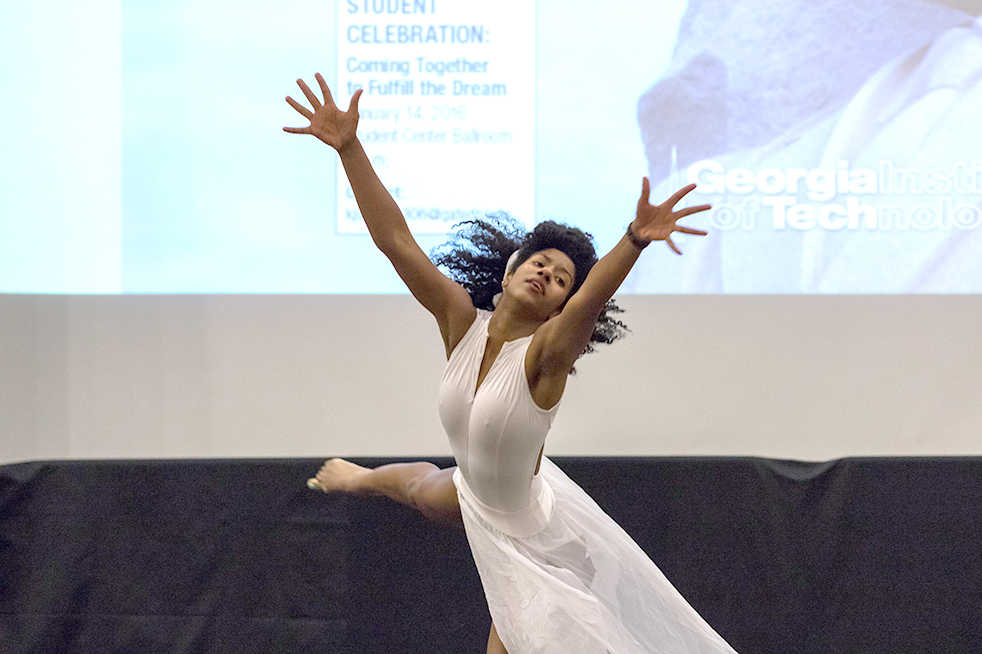In celebration of the renowned Martin Luther King Jr.’s Holiday, Tech hosted several events in the past week promoting the fight for civil and human rights and advancements in diversity.
The purpose of the celebration and the events was not just to appreciate the legacy of MLK and his leadership in the realization of the ‘60s dream, for many involved in the events believed that simply celebrating the history of Dr. King was not enough. The main goal of the events were to propose the question, “Who has the courage to lead and make strides for the future so that we can achieve the 2016 dream?”
Jeff Johnson, former national director of the Youth and College Division of the National Association for the Advancement of Colored People (NAACP), was invited to deliver an empowering lecture in the Student Center Ballroom on Jan. 13.
Johnson first posited that it was the environment around MLK that allowed him to lead the way he did — his courageous, unnamed followers. His next point was that Dr. King would not want money to be spent on the construction of statues of him but rather toward the institution that he created that pushes for civil rights and human rights.
“What made MLK unbelievable was that he was his authentic self even around people who didn’t like his authentic self,” Johnson stated.
In other words, unlike many of today’s leaders who shy away from making bold, “scary” statements, King did not feel obligated to make people comfortable; rather he strived to strike up conversations. Johnson claimed that we must be authentic — forget sounding politically correct — in order to achieve productive progress. Johnson was excited about the “Black Lives Matter” network because it is the first authentic, unsophisticated movement he has seen in a while.
“I’m not even talking about you,” Johnson said as he justified black people’s strong desire to say, “I matter.”
He explained that much of today’s leadership is uninspiring because it only pushes us to wish for things possible in the near future.
“Fake leaders always see themselves in the equation,” Johnson said. He explained that real leaders have visions so great that they cannot imagine their dreams being achieved soon enough to witness them. While he praised Dr. King’s “I Have a Dream” speech for being a fantastic, inspiring speech for the 1960s, he encouraged that we move on, because the people of this generation should be thinking of a new dream.
The next night, in the Student Center ballroom once again, Tech hosted a night of celebration of MLK, with alternating speeches and performances by diverse groups. Group performances were done by Taal Tadka, a fusion South Asian a cappella group, the Alpha Phi Alpha Fraternity and G.I.F.T.E.D., a non-profit Christian group. Experienced solo performer and second-year ME Ada Puyot sang Mariah Carey’s “Hero.” The last solo performance was an intense dance piece by Raianna Brown, a third-year IE and dance minor at Emory.
The students speakers were first-year BCHM Celeste Runnels, third-year IE Auston Kennedy, third-year PSYC Morgan Foreman and first-year IE Keertana. They spoke about their personal experiences, diversity and the importance of spreading love and acceptance. They encouraged students to lead in the push for rights. At one point during Subramani’s speech, she asked that each person in the audience take the hands of the people beside them. While everyone was holding hands, she finished by quoting the African proverb: “If you want to go quickly, go alone. If you want to go far, go together.” The speeches were hopeful, touching and mind-opening.
The importance of celebrating MLK at Tech is partly to encourage students here to realize that they have an excellent, diverse platform that they are able to use to the benefit of people more disenfranchised and with less access to such resources.
“Georgia Tech has a strong legacy of inclusiveness,” stated G.P. “Bud” Peterson, president of Tech, as he listed the strides the institute has made to foster diversity.
There is still work to be done to achieve certain rights and acceptance of marginalized groups. These celebrations of the past are in part to remind students here that celebrating is insufficient. People need to be accepting and to have the willingness and courage to lead and be the change that future generations need. By embracing diversity, individuals can achieve their highest potentials.
